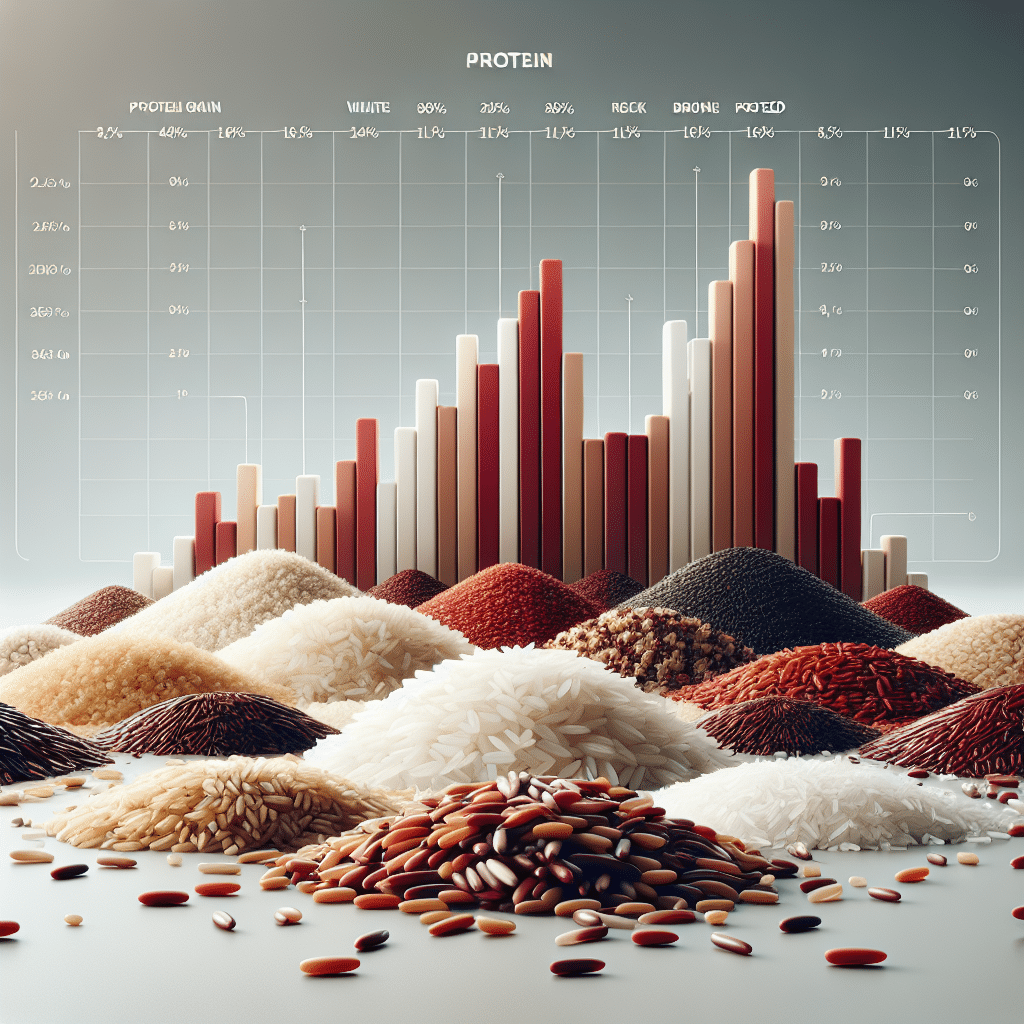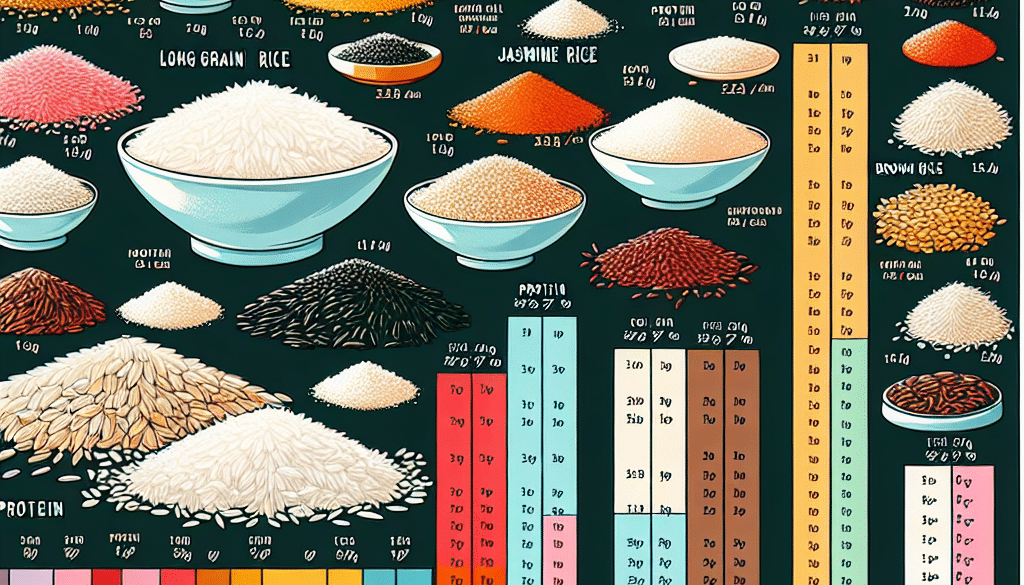What Rice Is Best For Protein? Deep dive
Table of Contents
Best Rice for Protein: A Comprehensive Guide

When it comes to incorporating protein into your diet, rice might not be the first food that comes to mind. However, rice can be a valuable source of protein, especially for those following a plant-based diet. In this article, we will explore the different types of rice and identify which varieties offer the most protein, as well as how to incorporate them into a balanced diet.
Understanding Protein in Rice
Protein is a crucial macronutrient necessary for building and repairing tissues, making enzymes and hormones, and supporting overall health. While animal products are often associated with high protein content, many plant-based foods, including certain types of rice, can also be good sources of protein.
Types of Rice and Their Protein Content
There are numerous varieties of rice, each with its own nutritional profile. Here are some of the most common types and their protein content:
- White Rice: White rice is the most commonly consumed type but has the least protein due to the removal of its bran and germ during processing.
- Brown Rice: Brown rice retains its bran and germ, making it richer in protein compared to white rice. It contains about 5 grams of protein per cup when cooked.
- Black Rice: Also known as forbidden rice, black rice has a similar protein content to brown rice but is higher in antioxidants.
- Wild Rice: Technically not rice but a grass, wild rice boasts a higher protein content than most traditional rice varieties, with about 6.5 grams per cooked cup.
- Red Rice: Similar to brown rice in terms of protein, red rice also contains antioxidants that are beneficial for health.
- Sprouted Rice: Sprouting rice can increase its protein content and make it easier to digest. Sprouted brown rice, for example, has slightly more protein than its non-sprouted counterpart.
Among these, the best rice for protein content is wild rice, followed by sprouted and brown rice varieties.
Maximizing Protein Intake from Rice
To maximize the protein you get from rice, consider the following tips:
- Pair rice with other protein-rich foods such as beans, lentils, or tofu.
- Choose whole grain or sprouted rice varieties over white rice.
- Incorporate a variety of rice types into your diet to benefit from their different nutritional profiles.
Case Studies and Research
Several studies have highlighted the benefits of consuming whole grains like brown and wild rice. For instance, a study published in the American Journal of Clinical Nutrition found that replacing white rice with brown rice was associated with a lower risk of type 2 diabetes. This is partly due to the higher fiber and protein content in brown rice, which can help regulate blood sugar levels.
Another study in the Journal of Nutrition and Metabolism showed that consuming sprouted brown rice could improve blood glucose and cholesterol levels, suggesting that the process of sprouting may enhance the beneficial effects of rice.
Protein Content Comparison
When comparing the protein content of different rice varieties, it’s important to look at the numbers. Here’s a breakdown of the approximate protein content per 1 cup of cooked rice:
- White Rice: 4 grams
- Brown Rice: 5 grams
- Black Rice: 5 grams
- Wild Rice: 6.5 grams
- Red Rice: 5 grams
- Sprouted Brown Rice: 5-6 grams
As you can see, wild rice and sprouted brown rice are at the top of the list for protein content.
Conclusion: The Best Rice for Protein
In conclusion, if you’re looking for the best rice for protein, wild rice is the clear winner. However, sprouted and brown rice varieties are also excellent choices that offer additional health benefits. By incorporating these types of rice into your diet and pairing them with other protein-rich foods, you can ensure you’re getting a good balance of nutrients.
Discover ETprotein’s High-Quality Protein Products
If you’re interested in enhancing your protein intake with high-quality supplements, consider ETprotein’s range of products. They offer organic rice protein, clear rice protein, and other plant-based protein powders that are non-GMO, allergen-free, and boast a neutral taste. These products are ideal for anyone looking to boost their protein consumption through convenient and versatile supplements.
About ETprotein:
ETprotein, a reputable protein and L-(+)-Ergothioneine (EGT) Chinese factory manufacturer and supplier, is renowned for producing, stocking, exporting, and delivering the highest quality organic bulk vegan proteins and L-(+)-Ergothioneine. They include Organic rice protein, clear rice protein, pea protein, clear pea protein, watermelon seed protein, pumpkin seed protein, sunflower seed protein, mung bean protein, peanut protein, and L-(+)-Ergothioneine EGT Pharmaceutical grade, L-(+)-Ergothioneine EGT food grade, L-(+)-Ergothioneine EGT cosmetic grade, L-(+)-Ergothioneine EGT reference grade and L-(+)-Ergothioneine EGT standard. Their offerings, characterized by a neutral taste, non-GMO, allergen-free attributes, with L-(+)-Ergothioneine purity over 98%, 99%, cater to a diverse range of industries. They serve nutraceutical, pharmaceutical, cosmeceutical, veterinary, as well as food and beverage finished product distributors, traders, and manufacturers across Europe, USA, Canada, Australia, Thailand, Japan, Korea, Brazil, and Chile, among others.
ETprotein specialization includes exporting and delivering tailor-made protein powder and finished nutritional supplements. Their extensive product range covers sectors like Food and Beverage, Sports Nutrition, Weight Management, Dietary Supplements, Health and Wellness Products, and Infant Formula, ensuring comprehensive solutions to meet all your protein needs.
As a trusted company by leading global food and beverage brands and Fortune 500 companies, ETprotein reinforces China’s reputation in the global arena. For more information or to sample their products, please contact them and email sales(at)ETprotein.com today.












